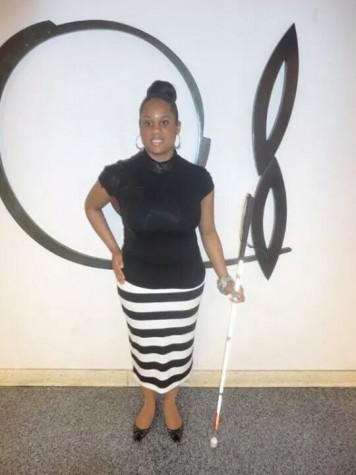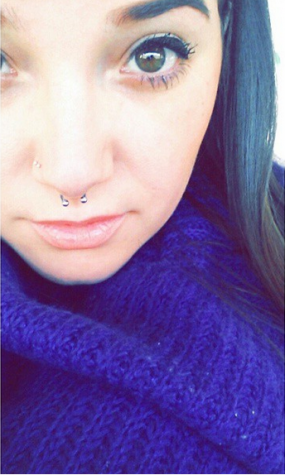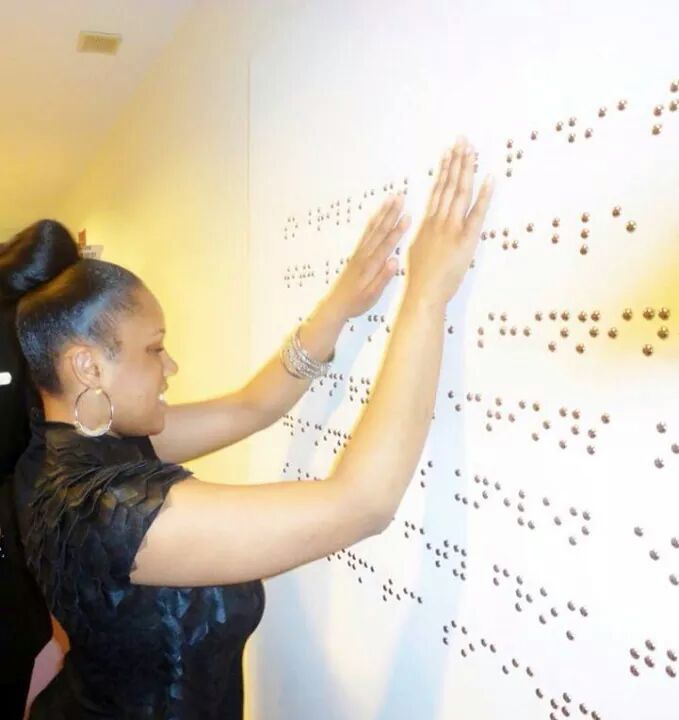The Life Of Riley
Ask Amane Riley, She Will Tell You She Isn’t Disabled. Once You Meet Her, You’ll Won’t Think So Either
Many people see her around campus and wonder how she does it all, as almost 21 year-old Amanie Riley is completely blind from retinoblastoma that took away her eyesight as a baby.
The Impact interviewed Riley last year around this time because of our fascination with wanting to get to know her.
She was more than thrilled when asked for a follow up interview of how her life has changed within the last 12 months.
“I truly appreciate this interview and I know it is a stepping stone to the interviews and articles that I will be a part of in the future,” Riley said proudly.
While Riley humbly says that not much has changed between her junior and senior year of college, she is often modest. In fact, her daily routine has always been far from ordinary. To many it may be a challenge; to her, it is just part of her everyday life that she smiles at greeting every morning.
“I won a $10,000 scholarship from the Lighthouse Guild and a $5,000 scholarship from the National Federation of the Blind this past summer,” Riley says nonchalantly.
The Lighthouse Gild is a leading not-for-profit vision and healthcare organization, with a long-standing heritage of addressing the needs of people who are blind or visually impaired, as well as those with multiple disabilities or chronic medical conditions.
“For the Lighthouse Gild scholarship, I was one out of 10 to be chosen out of 60 applicants,” Riley says proudly. “For the scholarship from the National Federation of the Blind, I was one out of 30 to be chosen out of 500 applicants.”
The National Federation of the Blind is the largest organization of blind and low-vision people in the United States. The NFB has grown to 50,000 members, as well as having affiliates and local chapters in every state, the District of Columbia, and Puerto Rico.
“I have already spent some of the scholarship money on this semester and the rest will go towards next semester and graduate school,” explained Riley.
While students who have 20/20 vision are struggling to maintain a nominal GPA and be a full-time student, Riley doesn’t have a problem with doing that.
“I have been in the Honors Program since my freshman year, and have maintained placement on the Dean’s List for the past three semesters,” says Riley. “I study hard and try my best to go above and beyond to show that I can accomplish the same things that a sighted person can, or may be able to do it better with a lot of effort.
“The key is time management, good study habits, and asking for help when it is needed.”
Riley has her foot in the door for a bright future.
“I am planning on attending Hunter College for graduate school and I want to study special education with a concentration of teaching blind and visually impaired students from pre-k to grade 12,” says Riley. “Only three schools in New York offer this program: Hunter College, Dominican college, and Columbia University. I will apply to all three, but I am hoping for Hunter.”
Even though Riley is excited to move forward with her education, she must admit that she is going to miss Mercy College.
“I will miss the wonderful professors and staff at Mercy, but I am ready to aim for the top and pursue my ultimate goal of becoming a TVI. I am excited to attend graduate school, and I am looking forward to a new change,” Riley said.
She explained how she is working on applying for a guide dog because it will help her navigate the city for efficiently and it gives her a boost of confidence with traveling.
However, she says that she is anticipating the days until she graduates in May. She says that she is not worried about accommodations at her new school, but she has certainly become accustomed to the great support system here at Mercy.
“The office of accessibilities (formally known as the office of disabilities) has been improving and has been a great support system for me,” Riley explains. “But I am not worried about the accommodation aspect because I know many blind people that attended Hunter and some of them used to be my teachers in high school.”
Riley seems to be very appreciative with all the help that she has gotten at Mercy as well as the people that contribute to her education. She went on to explain that Google contributed $1,000 to the scholarships and Ray Kurzweil, author and engineer at Google, contributed another $1,000.
Ray Kurzweil is the inventor of the first CCD flatbed scanner for the blind, the first omni-font optical character recognition, the first print-to-speech reading machine for the blind, the first text-to-speech synthesizer, the first music synthesizer capable of recreating the grand piano and other orchestral instruments, and the first commercially marketed large-vocabulary speech recognition.
“For example, if I put a piece of paper on the scanner, the software will read everything that is on the page. It’s pretty cool,” Riley explains.
While many people wouldn’t know what to do in Riley’s position, she lives happily and looks forward to her future.
“I am very excited for my new journey and I believe that I can offer a lot of insight to other blind students. I want to give them the same opportunities that I had such as learning to read and write Braille, using assistive technology, and have a positive learning experience,” she says in a hopeful voice with a bright smile on her face.
One item of note that Riley would like to see improve in the world is the etiquette shown toward blind people, or all disabled for that matter. She does not appreciate when people speak or act differently around her, or treat her as if she cannot understand or take care of herself.
“Some things that people say to me when they see me is, ‘Do you know sign language?’ Or they do not talk directly to me, but they will ask the person I am with all the questions about me as if I am not there. Example, ‘how old is she?’ Usually when people do things like that, I speak for myself until they get the point that I can talk for myself.”

Erminia Errante is FINALLY A SENIOR with an English Education major and a journalism minor. Living in Brooklyn, she has a passion for writing and loves...








